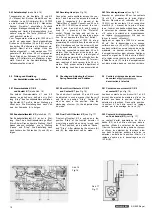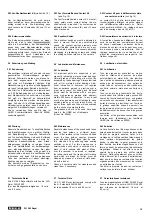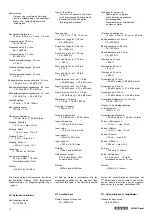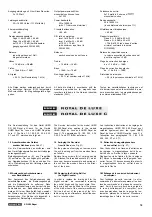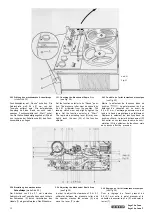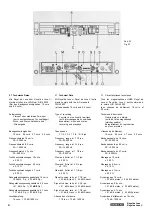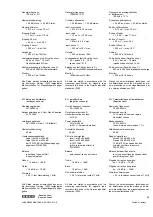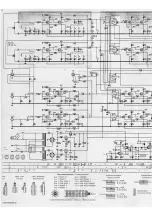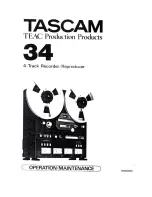
2.43 Aufnahmekopf (siehe Abb. 15)
Tongenerator an die Kontakte 1/2 und 4/2
(2 = Masse) der Buchse „Radio/Phono" an-
schließen. Je ein NF-Voltmeter (Ri > 10
an die Kontakte 1/6 und 5/6 (6 = Masse) der
Buchse „Projektor" anschließen. Tonband
einlegen, Bandgeschwindigkeit 19 cm/s ein-
schalten und Gerät in Betriebsstellung „Auf-
nahme" bringen. Die Taste „Mithören" darf
nicht gedrückt werden!
Vom Tongenerator werden jetzt 1000 Hz mit
ca. 50 mV eingespeist. Durch gleichmäßiges
Drehen der Schrauben (N) und (O) wird an
den beiden NF-Voltmetern ein Maximum ein-
gestellt. Damit ist die richtige Höhe des
Kopfes eingestellt. — Jetzt werden vom
generator 10 kHz mit ca. 50 mV eingespeist.
Durch Drehen der Schraube (P) wird an den
beiden NF-Voltmetern ein Maximum einge-
stellt. Damit ist die Senkrechtstellung des
Aufnahmekopfes erreicht.
2.43 Recording Head (see Fig. 15)
Connect an audio oscillator across the con-
tacts 1 and 2 as well as across the contacts
4 and 2 respectively (2 = ground) of the
"Radio/Phono" socket. Connect one AF volt-
meter (Zi > 10 MQ) each across the con-
tacts 1 and 6 as well as 5 and 6 respec-
tively (6 = ground) of the "Projector"
socket. Thread the tape and set the re-
corder for 7 1/2 ips and for recording opera-
tion. Do not depress the "Monitor" button!
Now feed a test signal of 1,000 Hz at ap-
proximately 50 millivolts from the audio oscil-
lator. Simultaneously turn the screws (N) and
(O) by equal amounts for maximum readings
of the two connected vacuum tube AF volt-
meters. Then the height of the head is pro-
perly adjusted. Now feed in a test signal of
10 kHz at approximately 50 millivolts from the
audio oscillator. Turn the screw (P) for maxi-
mum readings of both vacuum tube AF volt-
meters. Thus, proper azimuth adjustment of
the recording head has been accomplished.
2.43 Tête d'enregistrement (voir fig. 15)
Brancher un générateur BF sur les contacts
1-2 et 4-2 (2 = masse) de la prise -Radio/
Phono». Raccorder un voltmètre BF (Ri >
10 MQ) sur les contacts 1-6 et respective-
ment 5-6 (6 = masse) de la prise «Projec-
teur». Insérer une bande magnétique, mettre
le sélecteur de vitesses dans sa position
«19 cm/s» et enclencher le magnétophone
en régime
Ne pas en-
foncer la touche «Monitor»!
Appliquer un signal de 1000 Hz à environ
50 mV. Par le desserrage ou le serrage
uniforme des vis (N) et (O), régler le signal
des deux voltmètres sur sa tension de sortie
maximale. La hauteur correcte de la tête
d'enregistrement est ainsi obtenue. Appliquer
ensuite un signal de 10 kHz à environ 50 mV
et le régler sur sa tension de sortie maximale
à l'aide de la vis (P). La tête d'enregistrement
est alors ajustée dans sa position verticale.
2.5 Prüfung und Einstellung
der Kontaktfedersätze und Schalter
2.5 Checking and Adjusting the Contact
Spring Assemblies and Switches
2.5 Contrôle et réglage des jeux de lames
de contact et
de correction à la lecture
2.51 Stummkontakte K 1/K 2
und Kontakt K 7 (siehe Abb. 16)
Die beiden Stummkontakte K1 und K 2
müssen so justiert sein, daß sie nur in Stel-
lung „Stop" des Funktionswählers schließen.
Der Kontakt K7 muß in dieser Stellung ge-
öffnet sein. Die Einstellung kann nach Lok-
kern der Schraube (A) erfolgen.
2.51 Short-Circuit Contacts K 1 / K 2
and Contact K 7 (see Fig. 16)
The short-circuit contacts K1 and K2 must
be adjusted in such a manner that they will
only close in position "Stop". Contact K7
must be open in this position. After the
slackening of screw (A), the adjustment can
be made.
2.51 Contacts de court-circuit K 1/K 2
et contact K 7 (voir fig. 16)
Les deux contacts de court-circuit K1 et K 2
doivent être ajustés de manière qu'ils ne se
ferment que dans la position «Stop» du
sélecteur de fonctions. Dans cette position,
le contact K 7 doit être ouvert. Le réglage
s'opère par le desserrage de la vis (A).
2.52 Endabschaltkontakt K 3 (siehe Abb. 17)
Der Endabschaltkontakt K 3 ist nur in Stel-
lung „Start" des Funktionswählers geöffnet.
Er muß beim Drehen über die Stellung „Start"
hinaus ebenso schließen, wie in Stellung
„Pause" und "Stop". Die Einstellung kann
nach Lockern der Schrauben (A) und (B) er-
folgen.
2.52 Final Cut-Off Contact K 3 (see Fig. 17)
Final cut-off contact K 3 is only open in the
position "Start" of the function selector. It
must close equally when being turned past
the "Start" position, as in positions "Pause"
and "Stop". After slackening the screws (A)
and (B), the adjustment can be made.
2.52 Contact d'arrêt automatique
en fin de bande (K 3) (voir fig. 17)
Le contact d'arrêt automatique en fin de
bande (K 3) ne doit être ouvert que dans la
position «Start» du sélecteur de fonctions.
Il doit se fermer dans les positions
et «Stop» du sélecteur de fonctions, ainsi
que dans la position extrême droite de ce
sélecteur, au-delà de la position -Start». Le
réglage s'opère par le desserrage des vis
(A) et (B).
Abb. 16
Fig. 16
Abb. 17
Fig. 17
15
SG 560 Royal















